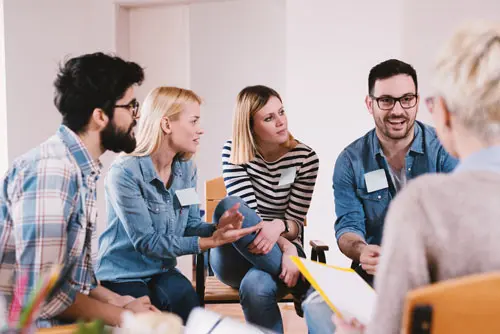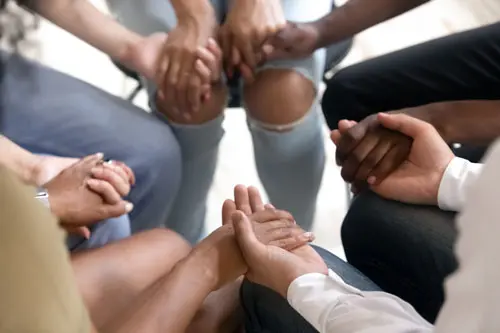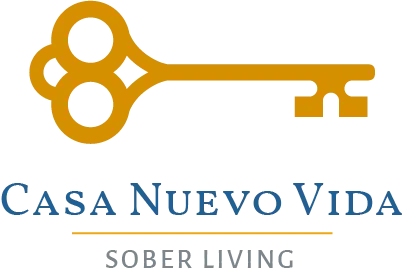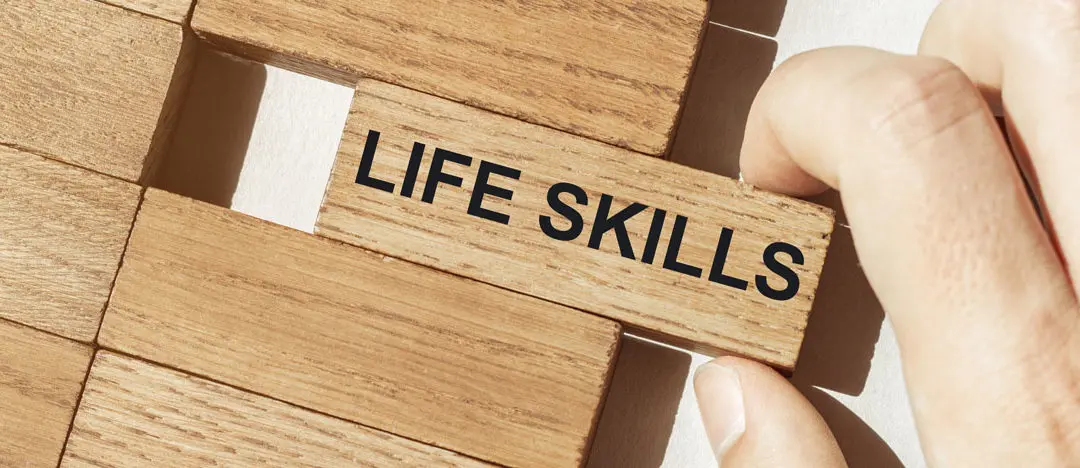One major element of successfully maintaining sobriety is the development of life skills for recovering addicts. Placing focus on early recovery skills is a priority for smooth integration into sober living. Avoiding relapse is certainly the forerunning challenge. However, it is valuable to consider that maneuvering through a newly sober life takes a whole new set of skills.
Proper development of life skills as a recovering addict is considered especially crucial in aftercare programs. Each aftercare activity you participate in will add more value to the one before. Take advantage of opportunities available after rehab. Utilize sober living programs and peer available support. They are all designed to strengthen your early recovery skills.
What Qualifies As A “Life Skill”?
In general, a life skill is any ability a person possesses that helps them maneuver more easily through everyday life. Think of them as social survival skills. Some are very natural and require little effort. Other life skills for recovering addicts take patience and dedication.
Adaption is part of why recovery skills are so important. Especially after active addiction, it will take time and practice to be able to maintain sobriety daily.
Not only do life skills reinforce the ability to cope, but they are necessary to set boundaries. Boundaries are essential for both for ourselves and with others and solidified both during rehab and while living sober.
The World Health Organization’s List of Essential Life Skills
The most fundamental life skills are recognized and categorized by the World Health Organization (WHO) Department of Mental Health. Several universal skills are beneficial to every person regardless of demographic differences. They allow us to obtain and satisfy our basic needs and adapt when necessary.
These life skills are essential aspects of social and psychological development. Some are seen as effortless and obvious, while others take time to acquire and fine-tune. Realistically, these differences are what make us all unique.
According to the WHO, the list of essential core life skills, include:
- Effective communication
- Self-awareness
- Critical thinking and creative thinking
- Decision making, problem-solving, and utilization of empathy
- Interpersonal relationships and setting boundaries
- Coping with stress and emotions
Inevitably, each individual performs better, or even just different than others, in distinct areas. Which, for better or worse, shapes their reality. Especially for recovering addicts, becoming familiar with each life skill can immensely help shed a light on areas of life that may need improvement, especially during the early stages of sobriety. It also guides focus toward which necessary life skills rehab reinforces, which will be useful in sobriety.
Communicating Effectively: The Most Important Life Skill For Recovering Addicts

Communication involves both verbal and nonverbal language. It is the most basic means of survival within society. Several subcomponents are exceptionally important life skills for recovering addicts. Although they may differ in effectiveness for everyone, maintaining a healthy balance of communication promotes a long-lasting recovery. Especially for setting goals and working through how to achieve them.
- Facing and resolving conflicts
- Utilizing the ability to have feelings
- Listening to respond appropriately
- Implementing negotiation tactics
- Acknowledging one’s capacity to accept or refuse proposals
While each situation might not call for every measure to be taken, you must understand how to use each effectively. Developing proficient quality early recovery skills of communication ensures one can meet their own personal and emotional needs.
Self-Awareness: Early Recovery Skills
Self-awareness is a very important early recovery skill. Especially, because who you are now, sober and in recovery, is often different from who you were during active addiction. It’s self-awareness that enforces self-control and confidence, long into the future of your recovery. Not only is it crucial to maintain wellbeing, but also to become aware of the progress made along the way.
Critical and Creative Thinking Life Skills After Rehab
Life skills for adults in recovery often revolve around either creative or critical thinking. Critical thinking is valuable when forming our own opinions and perspectives. This thought is often very analytical, relying on hard facts and reliable means. It’s likely that once a person is living sober, their mindset has been altered significantly, especially in regards to addiction. Being in recovery might take a bit to adjust to, which calls for a new outlook.
Creative thinking, on the other hand, involves more optimistic or innovative possibilities. Essentially, creative thinking requires out-of-the-box thinking to get to an outcome, when conventional means no longer satisfy. Or, even then there was no healthy resolve, to begin with. Recovering addicts with life skills such as critical thinking do well in finding new ways to best utilize their time.
Decision Making and Problem Solving Life Skills
Throughout our lives in recovery, there is no doubt we will encounter problems to solve decisions make. So it will be important to navigate through this, making the best possible decisions. But it is also important to figure out how these decisions affect others. Empathy is relating to the other person in a dilemma. By considering both sides of an issue, mutual resolve becomes a possibility. Therefore, concentration on these recovery skills helps to resolve conflict, and even, potential triggers set off by disagreement.
Interpersonal Relationships and Boundaries for Sobriety
A healthy interpersonal relationship consists of how we conduct ourselves around others who are central to us. This is how we set boundaries, which is exceptionally important for recovering addicts to avoid relapse and triggers. To maintain healthy interpersonal relationships, respecting your boundaries is an early recovery skill that takes time to work on developing.
Men’s sober living residents often report that their interpersonal relationships encourage maintaining a healthy life in recovery. Peer support and group participation in various life skills activities for adults in recovery combined provide the groundwork for overall well-being.
Coping With Stress and Emotions In Recovery
When it comes to coping with stress and emotions, unfortunately, we’ve all been there. Yet, when learning to cope, among other life skills for recovering addicts, avoiding stressful triggers are very necessary. However, especially when emotions are involved, this is not always easy.
While women in recovery often have the most difficult time away from family, women’s sober living homes offer the necessary support. Although we’d all like to be independently resilient, it is not always as easy when relapse looms. Yet helping each other to bounce back and keep moving forward is a quality life skill for recovering addicts. likewise, being able to provide that for another, instills a sense of purpose.
The Importance of Life Skills For Recovering Addicts

Basic life skills are starting points of development, evolving into the emotional, psychological, and physical individuals we all are. Yet, because of the differences in how each person harnesses their strengths, no two skills are mutually exclusive. Individuals in recovery often need to adjust the way they utilize certain life skills after addiction.
Basic life skills are starting points of development, evolving into the emotional, psychological, and physical individuals we all are. Yet, because of the differences in how each person harnesses their strengths, no two skills are mutually exclusive. Individuals in recovery often need to adjust the way they utilize certain life skills after addiction.
Learning and developing new life skills is important no matter who you are. They contribute to our jobs, to our well-being, to our family responsibilities, and our relationships. Everything you’ve ever done in your life has required some sort of life skill to complete the task. However, in recovery, some skills are even more valuable and may require some extra effort.
Essential recovery skills are often the focus after rehab. Many sober living activities are extremely enjoyable, and there are many to choose from. While it certainly can sound like a chore, with professional guidance, it can be fun! Getting to know oneself, while residing in a sober environment, and learning new important skills, makes up a healthy recovery.
The Benefits That Life Skills Add To Sobriety
Think for a second about all of the things that addiction has taken from you. Using certain life skills, you can begin to work to get them back. Think of all of the relationships that have been damaged along the way down the dark road of substance abuse. Using good communication skills, as well as self-awareness and plenty of empathy, some sort of forgiveness can be obtained. Even if that forgiveness is from yourself.
Once your life is no longer run by addiction, the possibilities become once again endless. Not to mention how much better you will feel when substances are not running the show anymore. Not only will you have control over your own life, but you can take back control of your future.
There’s no shortage of the advantages gained from being sober and working on early recovery skills. As a whole, they make life easier and more enjoyable. Although relapse and temptation may be constant hurdles, there are so many more positive attributes to a sober life.
Appreciating The Opportunity of a Sober Living Community
Another benefit of being able to maintain sobriety is the opportunity to reside in a sober living home among peers. Achieving a safe mental state of wellbeing and health requires a place of safety and security away from triggers. Working and participating in life skills activities for adults in recovery, brings you one step closer to achieving your goals, and regaining your self-esteem.
A sober living community is an opportunity to take the time to get to know yourself again. To be able to learn who you are sober, and how you interact with others around you. Once you have done the hard work, now it is about deciding on the next course of life.
A sober community takes away the immediate threat of temptation that you would otherwise face daily. Although temporary for many, it is a great chance to get everything else on track before moving on. Instead of having to manage everything all at once, think of it as the last stage of rehab, before the full force of the real world.
Life Skills For Recovering Addicts Through The Sober Living Experience
Other benefits that contribute to overall well-being through the development and practice of recovery skills include:
- Physically healing from many addiction-related illnesses.
- Experiencing the influx of healthy behaviors and feeling inspired to continue making more positive changes.
- Higher levels of self-respect, self-appreciation, and self-esteem.
- The ability to set attainable and beneficial goals for yourself and your sober future.
- Having the knowledge and understanding of clear-headed sobriety, to navigate through unfortunate or even potentially dangerous situations.
- Better at using self-control and discretion in stressful situations
- Being able to build and maintain healthy and supportive relationships through the life skills rehab has prepared you for.
Best of all there is no pressure of substance abuse looming in a sober living community. And still, it is much less restrictive than in a residential rehab facility.

Life Skills to Prevent Relapse as an AfterCare Priority
One major set of life skills for recovering addicts is going to be the ability to resist temptation. This requires the tools and will to rise to the challenge to choose sobriety every day. However, in doing so, day-in and day-out, the life skills rehab began teaching, like boundaries and perseverance will become more easily executed.
Utilizing all available sober living resources will be very helpful as you adjust. Being around individuals with common goals eases the pressure and stress of society in itself. Additionally, many life skills activities for adults in recovery are conducted in the form of support groups and meetings. Having options like this available close to where you reside is a luxury, especially in the most vulnerable times.
Life Skill Development For A Healthy Recovery
While in a sober living community, there will be much more to learn than just the basics of psychological well-being. Physical life skills after rehab will also be important. They will contribute to a whole sense of accomplishment and health, with feelings of fulfillment.
Many individuals who have suffered through a prolonged period of active addiction, lack the necessities of comfortable survival. For example, cooking and cleaning, household chores, or even laundry, may have been lost in the background. These seemingly essential priorities and activities were likely sacrificed when it was time to get high. However, now to be able to move forward, these are benefits to take advantage of.
For example, although finding an available job is going to be a priority, how will you cash your checks? What if you don’t have a bank account? What if you have outstanding debt to pay back? Medical bills? Children, that depend on you financially?
These are all things to consider but can be part of the recovery skills you take away from the program. And while that sounds simple, doing so without the security of a sober space to plan and learn, adds even more stress. Sober living programs are designed to gradually move you into your new sober life with less stress than otherwise. It’s wise to learn all you can, in a place eager to teach life skills to recover addicts.
Sober Living Is A Life Skill Within Itself
Every day that you get through sober is another day of the experience. Life skills for recovering addicts are almost always based on experiencing new things through sober eyes. However there are a few profound recovery skills that stand out, that sober living resources hope to advise upon.
For example, in recovery, a recovering addict would benefit from the following behaviors, and the life skills that they require:
Knowing when they are vulnerable, and when and how to ask for help.
This is essential to maintaining recovery, especially because relapse is always a risk. Although coping skills are practiced and reinforced throughout rehab, there are times when the reality is much tougher. It’s not always going to be as easy to navigate through than as planned. Although it may be frightening to feel uncertain about your sobriety, it is important to be aware of that. Even then, the smartest is to know that you need help. And finally, to be brave and ask for it.
Being Able to Accept Responsibility For Any Behaviors That Might Have Hurt Someone Else.
This can be an especially difficult early recovery skill. It is natural to try to blame offensive or thoughtless actions on the addiction, overcoming this can take time. Yet, as a recovery skill, taking personal responsibility should not be overlooked. When we can accept the reality of our past and our present, it reflects in our future choices. This awareness leads to better decision-making, as well as consideration for others.
Utilizing Resources For A Better Quality of Life In Recovery
Many life skills activities for adults in recovery revolve around making amends and reconciliation. However, that is not just between them and others. Specifically, it is about self-forgiveness and acceptance. Participating in support groups and meetings along the way reinforces making good choices and putting yourself as a priority. After all, your life belongs to you. Your quality of life depends on maintaining, and even enjoying, your sobriety.
Learning Recovery Skills With Sober Living Opportunities
Addiction and dependency are difficult to navigate through, even after rehab. To maintain a sober lifestyle with value, certain life skills for recovering addicts need to be practiced. Our team combines comfort and education into a rewarding experience while developing necessary recovery skills.
Addiction was stressful enough. Now it is time to decide how you will live the rest of your sober life. That includes the type of community that is worth being a part of and sharing it with.
Contact Casa Nuevo Vida’s admissions team today for more information about a superior sober living opportunity just right for you. Now that you have put in the work to get sober, make the most out of learning how to stay that way.
References:
https://www.linkedin.com/pulse/life-skills-soft-makes-you-better-vivekanand-nalla-lion-2500-
https://www.ncbi.nlm.nih.gov/pmc/articles/PMC4553654/
https://www.unodc.org/pdf/youthnet/action/message/escap_peers_07.pdf
https://www.criticalthinking.org/pages/defining-critical-thinking/766

